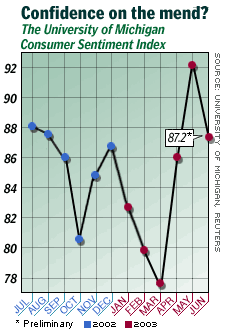NEW YORK (CNN/Money) -
A closely watched measure of consumer confidence in the United States fell in June, a published report said Friday, defying expectations of a gain.
The University of Michigan's consumer sentiment index fell to 87.2 from 92.1 in May, according to market sources quoted by Reuters. Economists, on average, expected a reading of 93.4, according to Reuters.

The expectations component of the index, which measures how consumers think the economy will perform in the next 12 months, fell to 84.2 from 91.4 in May, Reuters said. The current conditions index dropped to 92 from 93.2.
"Both current conditions and expectations remain above their wartime lows, but the reversal of previous gains undercuts the notion that the slowdown early this year owed only to geopolitical concerns," said UBS Warburg chief economist Maury Harris. "Consumers are clearly troubled by the absence of new hiring, and worry about income prospects."
Reacting to the report, U.S. stock prices fell, while Treasury bond prices moved mostly higher.
Wall Street pays close attention to consumers, whose spending makes up more than two-thirds of all U.S. economic activity.
Consumer sentiment rebounded in April and May, after a big slide in the walk-up to the U.S.-led war with Iraq, and most economists hoped it pointed the way to better overall economic performance in the second half of the year.
| Related stories
|

|
|
|
|
But business spending has continued to be sluggish, retail sales have been mixed at best, and the labor market has shown few signs of improvement.
Federal Reserve policy makers are scheduled to meet June 24 and 25 to debate cutting their target for a key short-term interest rate, and few economists doubt they will cut rates.
Though central bankers, including Fed Chairman Alan Greenspan, have long preached the consensus gospel of a second-half rebound, they're also noticeably nervous about the prospect of deflation, an unstoppable drop in prices that cripples corporate profitability and hurts the economy.
The Labor Department said Friday that wholesale prices fell again in May, following a record decline in April. Though the some of the report's details were hopeful, it likely did little to change the Fed's mind.
Other economic data in recent days have only cemented expectations of a cut. On Thursday, the Labor Department said jobless claims stayed at a high level last week, while the Commerce Department reported sluggish retail sales.
Economists usually take consumer confidence measures with a grain of salt; they don't always paint an accurate picture of how consumers will spend. Consumer sentiment plunged after the Sept. 11, 2001, terror attacks, for example, but consumers kept on spending.
And June's sentiment level is roughly what it was late last summer, before concerns about the war began bubbling to the surface of public consciousness; it's certainly not a sign that consumers are going to stop spending any time soon.
Nevertheless, most economists believe the labor market will have to improve, encouraging stronger wage growth, before consumer confidence and the economy will fully recover.
"Consumer spending growth has generally been trending at about 2.5-to-3 percent at an annual rate -- not booming, but not terrible," UBS Warburg economist Jim O'Sullivan. "The fact that the job market is still weak is restraining optimism a bit; hopefully, as the recovery gathers pace, we will start to see more job growth."

|

